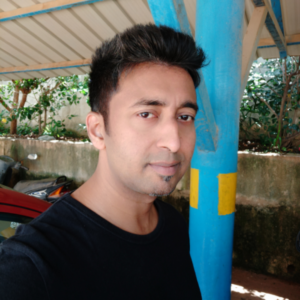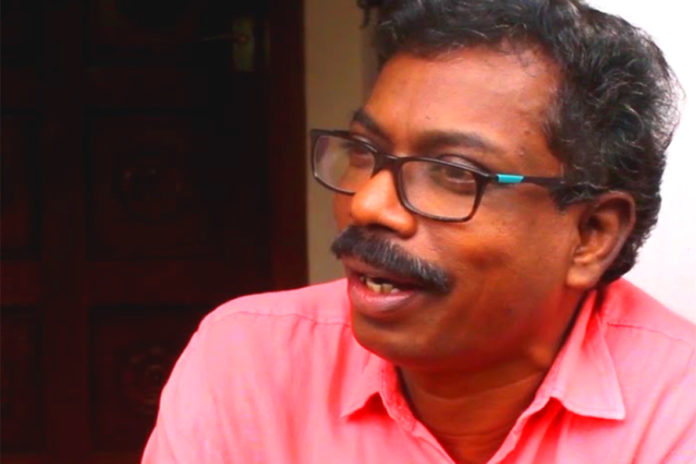Malayalam Poetry in Translation Series – 18
Translated by Aditya Shankar
The history of modern Malayalam poetry is a narrative of continuous innovation, gradual emancipation from the formalistic grip of traditional Sanskrit poetic practice, growing awareness of contemporary social issues and the ongoing democratization of the genre in thematic as well as formal aspects. In the process, paradigms have been tried and abandoned, communities imagined and dissolved, traditions constructed and deconstructed, the concepts of the region and the nation alternately tried out, the impact of foreign literatures absorbed and transcended, the classical and the folk heritage explored one after the other, fresh genres and formal devices employed and indigenized and the concept of the avant-garde transformed from one generation to the next. (Extract from the article ‘Malayalam Poetry Today’ by K.Satchidanandan)
*
Blackline Rasbora
I like to say
flashes of poetry than poems.
Like,
rasbora instead of fish.
I could etch at least a few
among the thousands of flashes
in my mind
Those that learnt to swim
in the mini rivers
of my world and imagination,
like the rasbora bearing tiny glitters
in my cupped hands.
They might get drenched in the rain
shiver and catch a cold
might get doused in a breeze
stumble and fall upon grass.
A few might remind
of school kids sans umbrella,
taking refuge in the shopfront.
Like clam thrown into the river,
they might scrape your banks
to eventually settle at the bottom,
will not stick with you for long.
Those who caught dragonflies
with ease in childhood,
might as well grasp poetry.
Somewhere in these lines
hides the sutured hands pointing at life,
the needle for which was threaded
with great difficulty
in dim light.
(Translation of Kayppakal)
Will Go On Hugging
Before
my dad
became my dad
and my mom
became my mom,
my father was solely mom’s
and mom, solely dad’s.
Dad’s home
was on this bank of the river,
mom’s on the opposite bank.
At this ghat,
dad went on bathing
while at the other
mom kept on rinsing clothes
that were already washed,
kept on washing utensils
that were already cleansed.
With a steel vessel,
she refracted sunlight
into dad’s eyes.
His songs whirled in her ears.
She tore off
the tiny poster of Yesudas
from beneath the plank,
inscribed dad’s name in charcoal
and applied the soot
that soiled her hands on her hair.
On the palm leaning towards the river,
dad fastened a twelve feet high pole
sat on it
and became a loudspeaker for mom.
And as dad sings from there,
mom would lie on a strewn mat
spread on the dung coated floor,
would roll her feet
and gaze at dad through the window,
sparkling like a ripple.
On moonlit nights,
they would swim midstream
from their ghats,
to build a honeyed island.
Dad would use his left hand
and mom would use her right
to go on hugging,
would use their other hands
to keep themselves afloat
in that bottomless depth.
Even if they tear away
like a cloth
swimming back to their own ghats
midstream water remains sugary.
Inside them,
I would keep bubbling up
in anticipation of that moment
when they decide to swim
to the same shore.
Dad loses sleep
chain smokes the beedi
and keeps staring at the other bank.
Without the language to say,
Dad, swim across the river,
a part of me would wiggle.
Sleepless,
mom would toss and turn in her bed
late into the night.
Without the tongue
to whisper in her ears,
Mom, swim across the river,
the other part of me would fume.
Futile,
a river
a bank
an opposite bank
between dad and mom.
Futile,
even me.
Still,
I go on hugging them,
go on hugging them.
(Translation of Vaari Vaari Punarum)
The Discovery
As far as I can remember,
we always hid together
while playing hide and seek.
Doing so,
we discovered
the technique
to turn
saliva into honey
at thirteen.
(Translation of Kandupidutham, Thorcha Magazine)
The Run
Friend,
I’m running at my
maximum speed…
It isn’t that
I’m not upset
even snails zoom past.
But what do I do?
This is my maximum pace.
(Translation of Ottam, Thorcha Magazine)
About the Author:
M.R. Renukumar is a poet, painter and translator. With a M.Phil. in Economics, his day job is with the State Audit Department in Kottayam. He has published three collections of poetry: Keninilangail (In Marshy Lands, 2005), Veshakkaya (The Fruit of Knowledge, 2007) and Pachakkuppi (Green Bottle, 2011). His other works include Naalaam Classile Varaal (Snakehead Fish in the fourth standard, 2008), Poykayil Yohannan (2009, biography of the activist, poet and socio-religious reformer of the same name), and a book of essays and reminiscences, Muzhusooryanaakaanulla Shramangal (Attempts to be a Full Blown Sun, 2013). He has translated the graphic biography of B.R. Ambedkar, Bhimayana: Experiences of Untouchability, from English into Malayalam (2014). He is editor of the volume Don’t Want Caste: Malayalam Stories by Dalit Writers (2017).
About the Translator:

Aditya Shankar is a Pushcart Prize and Best of the Net nominated poet, flash fiction author, and translator. He edited Tiny Judges Shall Arrive (AHRC, Hong Kong), a selection of KG Sankara Pillai’s poems translated into English. His translations have appeared in the SAARC anthology of poetry, Muse & Murmur, Modern Poetry in Translation, Ethics in Action and elsewhere. His poems have been translated into Malayalam and Arabic and published from 20 or more nations. His poetry collections include After Seeing (2006), Party Poopers (2014), and XXL (Dhauli Books, 2018). His short films have participated in International Film Festivals. He lives in Bangalore, India . (https://adityashankar.ucraft.net/).
















